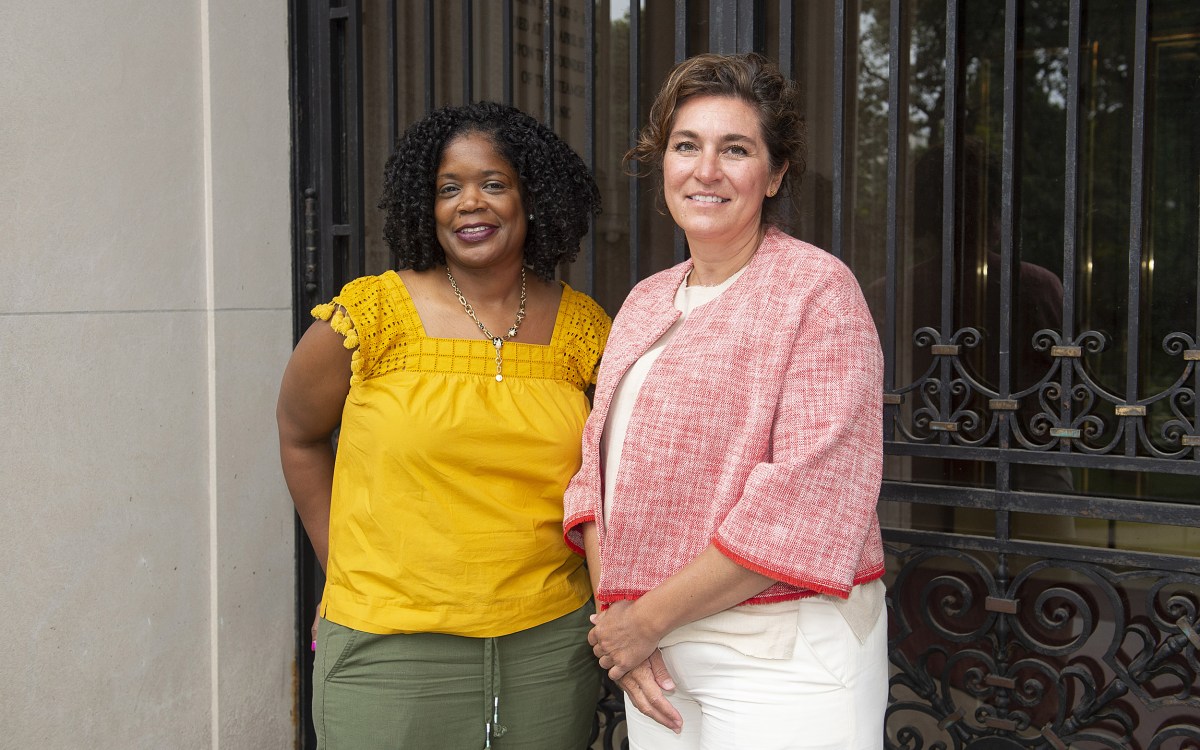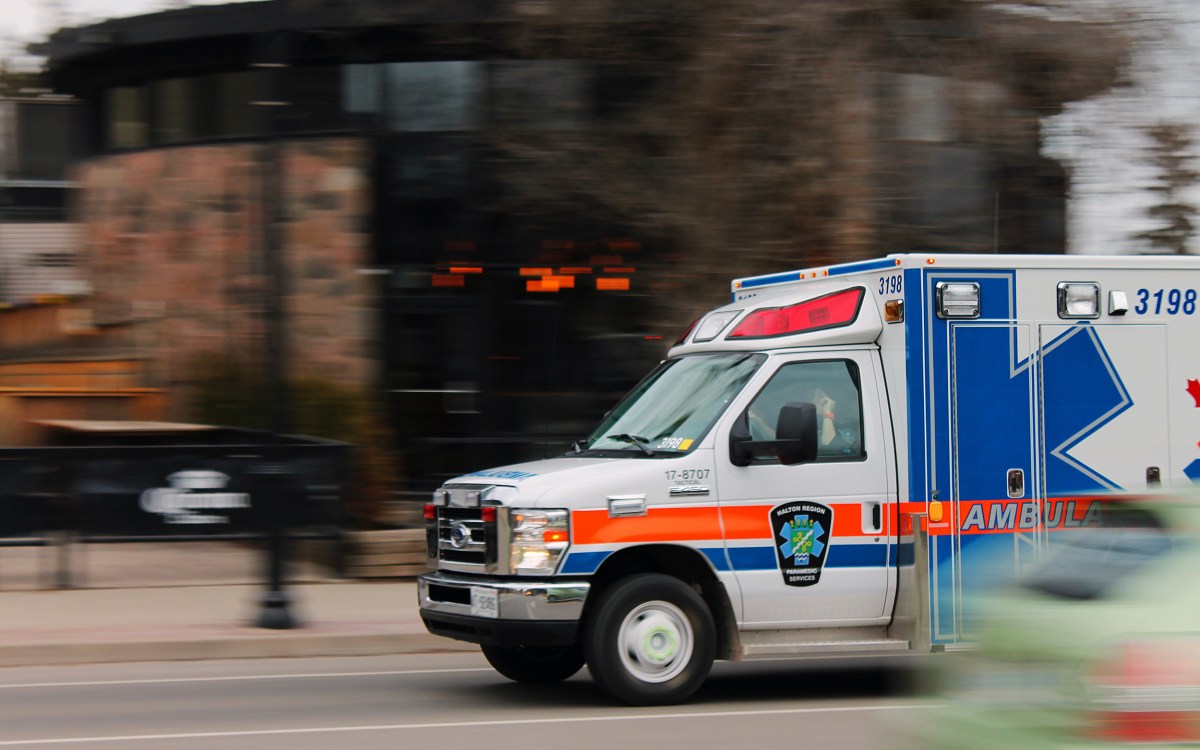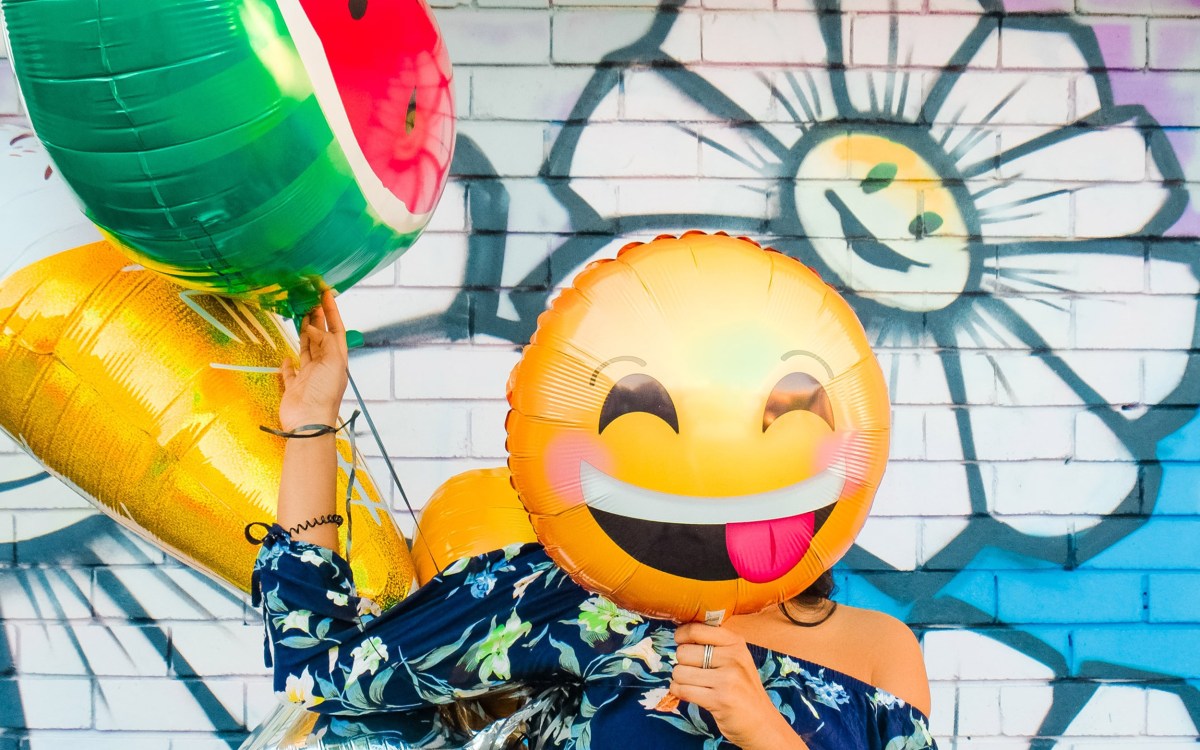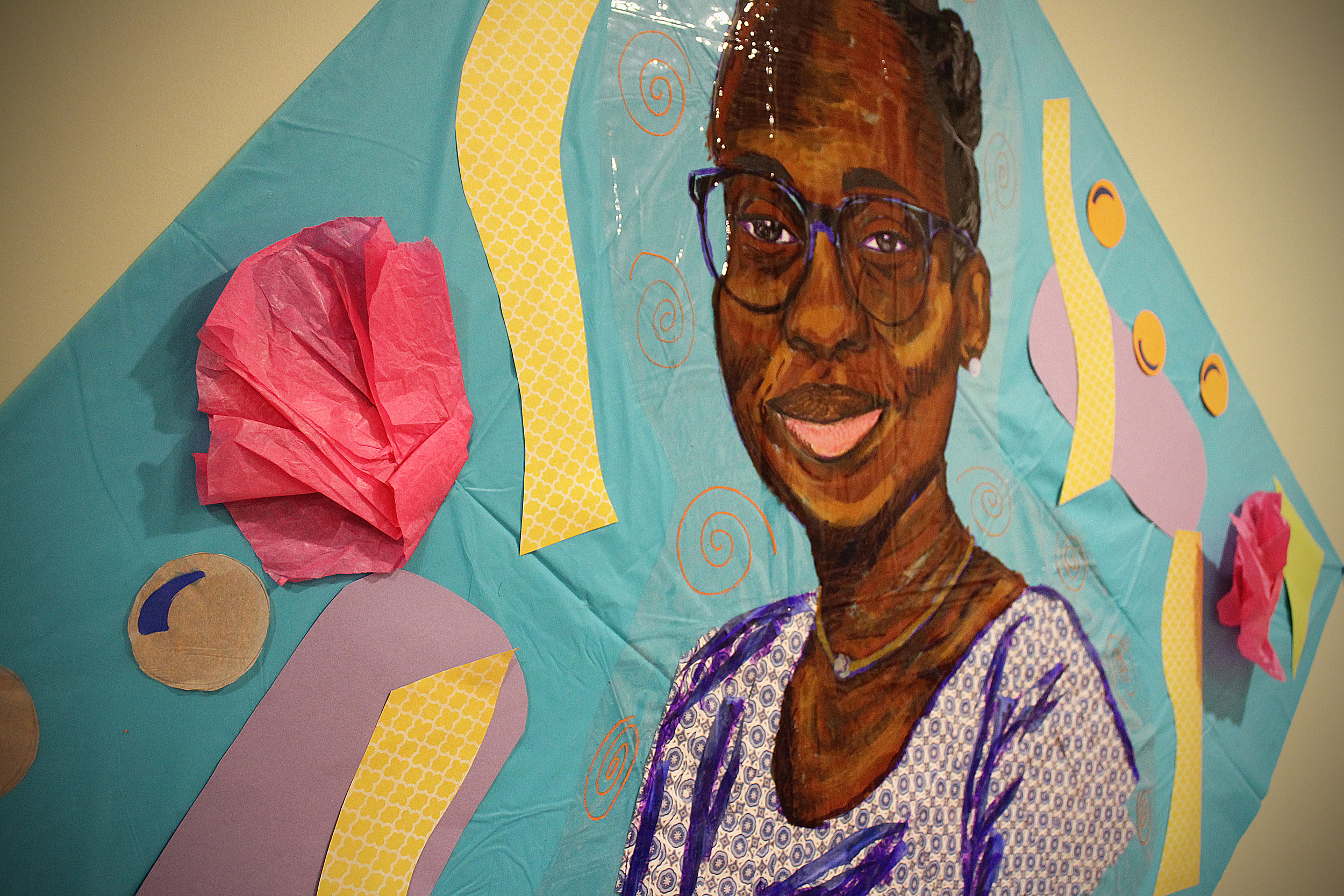
Artist Chanel Thervil’s portrait of Sabrina Dorsainvil was part of an open discussion about self-care and the Black community.
Photo by Chanel Thervil
In painting others, Black artists discover a picture of self-care
Two share experiences, offer advice at ‘Portraits’ virtual event
Sometimes, in describing others, we instead show ourselves — and what it is we need. So it was with Chanel Thervil, a Boston-based Haitian American mixed-media artist and educator, who started “The Quarantine Self-Care Portrait Series” as a way to connect with other artists of color and encourage them to speak up for self-care, for themselves and for the Black community.
Mental health maintenance is not a concept widely embraced in communities of color, and by artists in particular, Thervil said. For her, the textural portraits she developed for the series were not simply expressions of her artistic skills, but a coping mechanism as well.
“As the world evolves, the way we care for ourselves needs to evolve too,” she said. “Every week feels different and you need different tools and support to make it through these difficult times, explicitly the management of everyday life.”
“Fresh Breaths: A Portrait of Sabrina” captured Sabrina Dorsainvil, director of civic design for the Mayor’s Office of New Urban Mechanics. It was unveiled online during “Portraits in Pajamas,” a playful yet poignant Instagram Live event put on by the Harvard Ed Portal on Sept. 25. In it, Thervil and Dorsainvil explore how artists of color in any media are navigating the new patterns of living the pandemic demands.
The conversation between Thervil and Dorsainvil celebrated the place where community, art, and social justice meet. It was the first collaboration for the two artists, who during a Q&A with the online audience shared ways to process the day-to-day racial trauma that African Americans experience.
Time-lapse video of Chanel Thervil creating Sabrina Dorsainvil’s portrait.
Credit: Chanel Thervil
“So many Black and brown folks are being pressed with the question of our humanity being challenged, and it’s become really clear I haven’t done a good job prioritizing myself and trying to show up for myself,” Dorsainvil said. “I fell short of seeing myself as one of those people who needs to be cared for. This moment in time has created a sense of urgency around that.”
Dorsainvil is an artist, designer, and illustrator whose work invites people to look inward and be tender with themselves. She said she believes that many people now feel disconnected socially, and can use this a moment to dig inside and express themselves through art.
“One of the biggest fears I had early on in the pandemic, behind closed doors, was wondering how folks were really doing,” she said. “What is broken is often invisible, or different from reality, and folks may not have the words for it. Art creates the space to have critical conversations.”
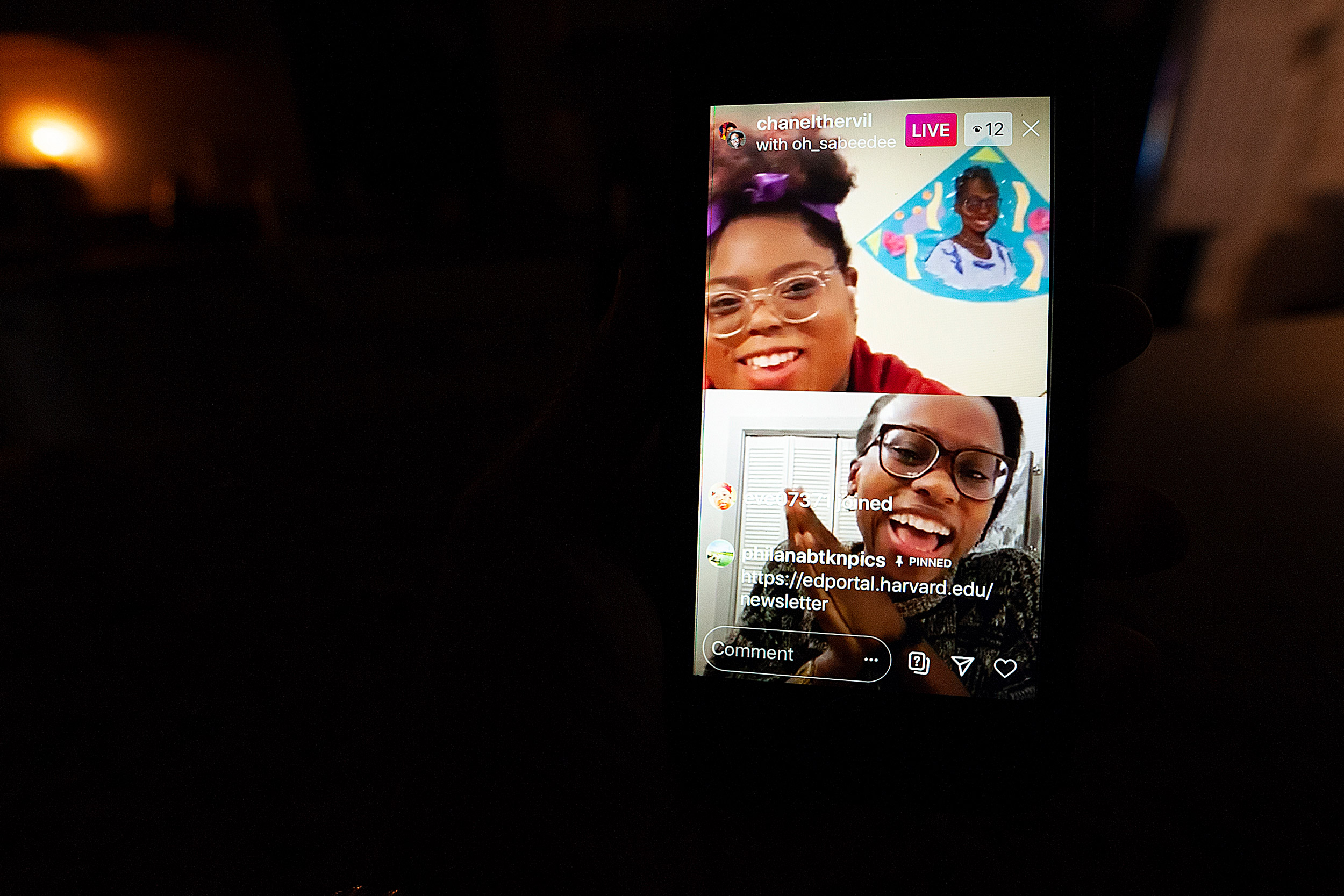
One of those conversations should address speaking up as a form of self-care, Thervil said. She said women of color are often too intimidated to ask for what they need or want, whether it be space for themselves or having their voices heard.
“As a Black woman, it’s hard to feel confident enough to articulate what you need without a disclaimer, or an apology, or a justification about why it’s necessary,” she said. “I’ve been flexing more of that boundary muscle and creating space for things that I care about.”
Unveiling her portrait of Dorsainvil — the fifth in her “Quarantine” series — was one of those things.
“Let’s get close, let’s get intimate,” Thervil said as she zoomed in on the portrait. “Can we have a drumroll, please?”
Dorsainvil said this was the first time she had been the subject of a portrait, and she was honored.
“I love that she is able to visualize people and capture an interest that often doesn’t show up in day-to-day conversations,” she said. “There are always those other layers of identity we carry, and I’m floored by the women of color artists who are there having each other’s backs for each other.”
“It feels good to be in community with another Black woman, to prioritize pleasure, and cheer each other on,” Thervil. “Sometimes you need reminders that there are still good things happening, people who are trying, and these conversations are a testament to that.”
“I fell short of seeing myself as one of those people who needs to be cared for. This moment in time has created a sense of urgency around that.”
Sabrina Dorsainvil
Thervil said it’s nice to see institutions like the Ed Portal experimenting with nontraditional digital platforms to help people to plug into the arts. She said her “Portraits in Pajamas” creates “an opportunity to hear directly from artists about how they are being impacted, as well as their practice, things they care a lot about, and things they are learning about.”
Philana Brown, arts program coordinator at the Harvard Ed Portal, said it is important to think about how to connect its programs to the community they serve.
“It’s wonderful being able to sit in a virtual living room with Chanel and Sabrina and see them coming together through art and creativity in response to COVID, isolation, and the racial justice movement with the premise of self-care,” she said. “It offers a different lens for the community to experience these really important issues.”
This was the Ed Portal’s first foray into using a live social media platform. Eve Alpern, assistant director for arts programming, said the women’s messages are so of the moment that the Ed Portal wanted to ensure the community had a place to react, comment, question, and learn — viz., Instagram Live.
“They both have such important voices, we’re delighted to have an event where we can join into their conversation in an authentic way, and connect their work into the Ed Portal platform,” she said. “I hope that we continue to dig deep, amplify, and double down on our commitment to supporting artists and our community.”



